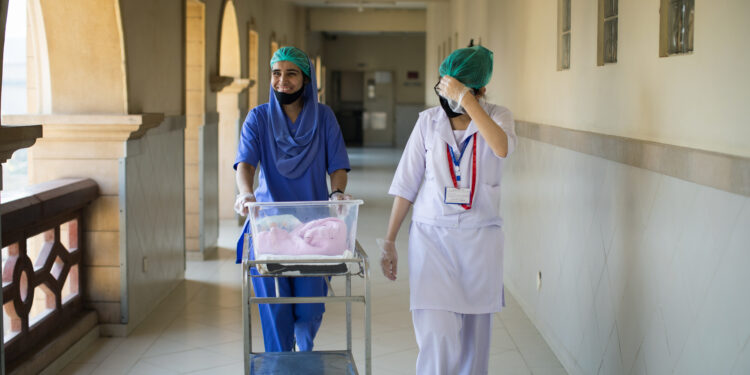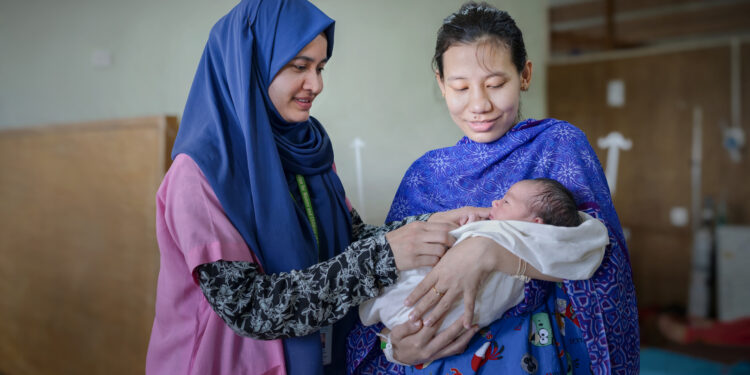The Impact of Climate Change

Background
Global warming, already at 1°C above pre-industrial levels, threatens to reach 1.5°C by 2052 if fossil fuels and greenhouse gas emissions keep rising. The consequences are widespread and dangerous, including extreme heat, rising sea levels, and more frequent and intense climate disasters including hurricanes, droughts, and floods (1).
Heat stress is a major concern for pregnant women as their bodies work harder to regulate temperature, straining the cardiovascular system and potentially leading to complications like dehydration, gestational diabetes, and even preeclampsia. Heat impacts fetal development and is linked to an increased risk of preterm birth, low birth weight, and stillbirth (2). The developing fetus is particularly vulnerable to disruptions in temperature regulation. Rising temperatures make working while pregnant more difficult and hazardous. Unpredictable rainfall patterns threaten homes with floods and destroy crops. Wildfires, fueled by climate change, pollute the air with harmful smoke that can cross the placenta and harm pregnancy health (3). The climate crisis and the associated lack of resources also contributes to sexual and reproductive health and rights (SRHR) challenges, including early and forced marriages, and an increase in gender-based violence (4). Furthermore, climate disasters that are a result of climate change, lead to displacement, infrastructural damage, and a loss of continuity of care in pregnancy all of which contributes to increased maternal and neonatal mortality and morbidity and a breakdown in the provision of quality care.
Position
Midwives, as care providers and defenders of women’s sexual and reproductive health and rights are key players in designing resilient health systems capable of withstanding the worst impacts of a warming world, delivering environmentally sustainable health services, and empowering women and gender diverse people to make decisions that benefit themselves, their families, and the planet.
Many of the catastrophic effects of climate change have serious consequences for women, newborns, and families as well as for midwives themselves. This includes the direct effects of rising temperatures and increasing carbon emissions on maternal, neonatal health and reproductive health, along with climate disasters such as floods, cyclones, and wildfires which lead to displacement, adverse health outcomes and a breakdown in services which disproportionately affect women and children. It is therefore important for midwives and the midwifery profession overall to recognise the significance of the threat of climate change and the critical role of midwives and associations in emergency preparedness and response and the management of local and global issues relating to climate change.
Recommendations
ICM urges member associations to:
- Be aware of and accept the scientific consensus that global climate change is occurring and that human behaviours are making significant contributions,
- Incorporate the health implications of climate change for childbearing communities into midwifery education and professional development,
- Learn about the indirect effects of climate change on the SRHR of people in vulnerable positions,
- Recognise the importance of midwifery input in climate change policymaking at national, regional, and global levels and aim to achieve representation wherever possible,
- Contribute to knowledge equity around the effects of climate change on SRMNAH and the role of midwives by sharing latest evidence with members and other midwives,
- Advocate with governments to be involved in emergency response and preparedness plans for climate emergencies,
- Actively work on understanding and highlighting community needs in climate emergencies to influence resource allocation and gender sensitive approaches for disaster management and recovery,
- Encourage government agencies to strengthen public health infrastructure to ensure that the global health effects of climate change can be anticipated and responded to more efficiently within childbearing communities. Advocate for climate friendly and climate resilient health facilities, including the use of sustainable energy sources wherever possible,
- Encourage midwives to serve as role models for promoting environmental sustainability and play an active role in educating women and their families on sustainable practices,
- Conduct research to further inform the climate change agenda in relation to both midwifery practice and the impact of climate change on the childbearing community,
- Advocate for SRMNAH to be included in all climate adaptation planning.
References
- Intergovernmental Panel on Climate Change (IPCC), “Synthesis report of the IPCC Sixth Assessment Report,” Summary for Policymakers, March 20, 2023
- “Extreme Heat Is a Pregnancy Health and Reproductive Justice Problem”; Human Rights Watch, 2023
- A Review of Potential Mechanisms of Placental Toxicity, Impact on Obstetric Outcomes, and Strategies to Reduce Exposure,” International Journal of Environmental Research and Public Health 19, no. 21 (2022): 13727, accessed October 12, 2023
- Global Girlhood Report 2023: Girls at the Centre of the Storm – Her planet, her future, her solutions; Save The Children, 2023
Adopted at Prague Council meeting, 2014
Reviewed at Council Meeting, 2021
Reviewed and adopted at Virtual Council Meeting, 2024
Due for next review 2027




